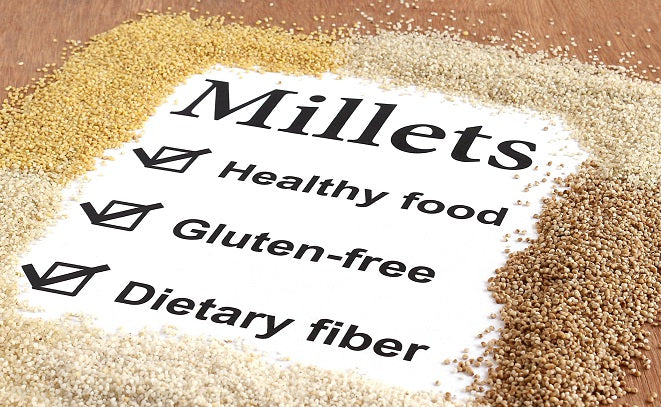Collection: Millets
Millets are a group of small-seeded grasses that have been cultivated for thousands of years and are primarily grown for their grains. They are known for their nutritional value, resilience, and adaptability to various climates and soil conditions. Here is a brief overview of millets:
-
Variety: Millets encompass a wide range of species, including but not limited to pearl millet (bajra), finger millet (ragi), foxtail millet, proso millet, barnyard millet, and little millet. Each type has unique characteristics and is suited to different growing conditions.
-
Nutritional Value: Millets are highly nutritious and offer several health benefits. They are rich in protein, fiber, vitamins (especially B vitamins), and minerals like iron, calcium, and magnesium. Additionally, millets are gluten-free, making them suitable for individuals with gluten sensitivity or celiac disease.
-
Diverse Uses: Millets have diverse culinary uses. They can be used to make a wide range of dishes, including porridge, flatbreads, rice substitutes, and even desserts. In some regions, millets are used for brewing alcoholic beverages.
-
Climate Resilience: Millets are known for their ability to thrive in harsh and variable climatic conditions. They require less water compared to other staple crops like rice or wheat, making them a sustainable choice in regions facing water scarcity or erratic rainfall.
-
Cultural Significance: Millets have deep cultural and historical significance in many parts of the world, especially in Africa and Asia. They have been a staple food source for communities in these regions for centuries.
-
Health Benefits: Consuming millets is associated with various health benefits, including improved digestion, lower cholesterol levels, and better control of blood sugar levels. They are also considered a valuable part of diets aimed at combating malnutrition and hunger.
-
Global Resurgence: In recent years, there has been a resurgence in the cultivation and consumption of millets due to their nutritional benefits and environmental sustainability. Millets are gaining popularity as a part of a diversified and balanced diet.
-
Sustainable Agriculture: Millets are considered an environmentally friendly crop. They have low water and fertilizer requirements and can be grown with minimal chemical inputs. This makes them a valuable option for sustainable agriculture and food security.
-
Challenges: Despite their many advantages, millets have faced challenges such as low awareness, limited modern processing techniques, and the dominance of other cereals in global diets. Efforts are being made to promote millets and integrate them into mainstream food systems.
-
Future Prospects: Millets are expected to play a vital role in addressing food security, nutrition, and sustainability challenges in the coming years. Research, policy support, and consumer awareness are crucial factors in promoting millet cultivation and consumption.
In conclusion, millets are a group of versatile and nutritious grains with a rich cultural history and promising prospects in the context of sustainable agriculture and improved global nutrition. Their revival and integration into modern diets hold great potential for a healthier and more sustainable future.

-
Barnyard Millet 250 Gm
Regular price Rs. 160.00Regular priceUnit price / per -
Kodo Millet(varagu) - 250 gm
Regular price Rs. 140.00Regular priceUnit price / per


